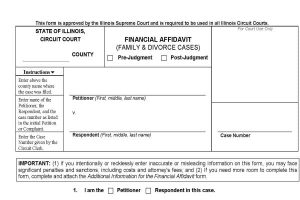
Kane County Divorce: What is a Claim of Dissipation in an Illinois Divorce?


Ilyssa Panitz freely admits she gave up the financial reins when she got married.
“I did not keep an eye on the money, even though I got married later in life,” says Panitz, 54, who lives in Westchester County, N.Y. “My former spouse worked in accounting and I was taking care of the kids, and I figured ‘This is great’.”
Then, after 13 years of marriage, says Panitz, who hosts the nationally syndicated radio show, “The Divorce Hour with Illyssa Panitz,” she told her husband she wanted to split up. And she realized her ignorance about their money situation “was my biggest mistake and biggest downfall. I had the rug pulled out from under me.”

The question of child support seems to be a basic question, but one that sometimes causes confusion. It used to be some years ago that the noncustodial parent was obligated to pay child support to the parent with the “primary custody of the child or children.” Illinois has largely done away with old concepts of child custody and child support, and now centers its laws on allocating more equally the parenting time of the children, and setting support such that both parents’ incomes are factored in.
Child support is now calculated using an “income shares” model, which considers both parents’ incomes and the number of children. The key factors in determining child support include:
| A “source of funds” rule refers to a legal principle, primarily used in divorce proceedings, that determines whether a property should be classified as marital or separate based on the origin of the funds used to acquire or improve it; essentially, it means that if a spouse contributes premarital funds to purchase a marital asset, they may retain a separate interest in that asset proportional to their contribution.
The husband filed for dissolution after 18 years of marriage, disputing whether two adjacent lots were marital property. One lot included the marital home, and the other had a barn for the wife’s horse training business. The husband purchased both lots before the marriage, but both were encumbered by loans paid off with a mix of marital and premarital funds. The properties appreciated significantly during the marriage due to market forces. The key issue was whether paying down the loans with marital funds created a marital interest in the properties. The District Court concluded that the lots were nonmarital property, except for the marital contributions toward the loan principals. The court awarded the husband the properties and the wife a cash equalization payment for half of the marital contributions. The wife appealed, arguing that the properties should be considered marital due to the use of marital funds to pay down the loans. The Court of Appeals affirmed the district court’s decision regarding the land portions of the lots, finding them nonmarital. However, it reversed the decision regarding the barn and other improvements on one lot, classifying them as marital property due to the joint efforts in their construction and operation. The court modified the equalization payment to the wife accordingly. The Supreme Court reviewed the case and adopted the “source of funds” rule, which considers the marital estate’s acquisition of equity in the properties through loan paydowns with marital funds. The court reversed the Court of Appeals’ decision regarding the land portions of the lots and remanded the case for a new hearing to determine the equitable division of these properties, considering the source of funds rule. The decision regarding the barn and other improvements was affirmed. |
The issue of cohabitation in Illinois divorce cases is an interesting one. Sometimes, a spouse that is receiving maintenance support engages in a relationship with a third party after the divorce. The payor spouse many times feels a bit cheated, in that a former spouse (payee) receives financial support while at the same time dating someone exclusively and sharing their home with him/her. In Mattson, a former husband felt burned that he was paying support to his ex-wife while she was engaging in a lengthy relationship with a Chicago sportscaster. The former husband hired private investigators to watch the former wife’s house. Former husband brought his case to Court.

Marriage of Mattson: 2024 IL App (3d) 230307-U
Section 510(c) of the Dissolution Act provides that, “Unless otherwise agreed by the parties ***, the obligation to pay future maintenance is terminated upon the death of either party, or the remarriage of the party receiving maintenance, or if the party receiving maintenance cohabits with another person on a resident, continuing conjugal basis.” 750 ILCS 5/510(c) (West 2022). (Emphasis added.)
Valuing a small business in a divorce can be complex and often involves several methods. Here are some common approaches:

Confusion still reigns with respect to the tax treatment of spousal maintenance for Illinois divorce cases. I still see other law firms discussing online spousal maintenance (support) using the old rules.
In Illinois, spousal maintenance (also known in other states as alimony) is generally not tax-deductible for the payor nor taxable income for the recipient. This change came into effect due to the Tax Cuts and Jobs Act (TCJA) of 2017, which significantly altered the tax treatment of spousal support (maintenance) nationwide.
Under the TCJA, for divorce or separation agreements executed after December 31, 2018, maintenance payments are no longer deductible by the person paying the maintenance and are not considered taxable income for the person receiving it. This change applies to federal taxes and, in most states including Illinois, state taxes follow federal guidelines on this matter.
One aspect of my practice is to deliver high level legal skill to my clients, while at the same time optimizing their outcomes in a cost-effective manner. Divorces don’t need to cost an “arm and a leg.”
Divorce can be emotionally and financially taxing for all parties involved. While the emotional aspect might be harder to mitigate, there are several strategies to save on the cost of divorce: